Worlding Higher Education Differently (WHEd) explores how immersive learning initiatives can transform higher education by addressing fragility, inaccessibility, and the need for resilience in a post-pandemic world. It aims to foster student competencies for transformative change through open, iterative learning systems. Key objectives include: 1) identifying strategies for learning continuity and accessibility; 2) uncovering institutional barriers; and 3) leveraging digital technologies for equitable, diverse, and inclusive education.
The research focuses on three core questions: advancing transnational student collaborations, decolonizing creativity through art-science partnerships, and using technology to equalize access to lifelong learning. Aligned with the UN SDG 4.7.1, the project includes international virtual exchanges, art-neuroscience collaborations, and the creation of an open-access archive of transmedia activations. These activities are framed within a creative commons ecosystem, involving researchers and practitioners from Colombia, Egypt, and Canada. The goal is to build more resilient, sustainable, and inclusive higher education environments globally.
We gratefully acknowledge this research is funded by the Government of Canada’s New Frontiers in Research Fund (NFRF) 2022-00245.
Nous reconnaissons avec gratitude que cette recherche est financée par le Fonds Nouvelles frontières en recherche (NFRF) 2022-00245 du gouvernement du Canada.
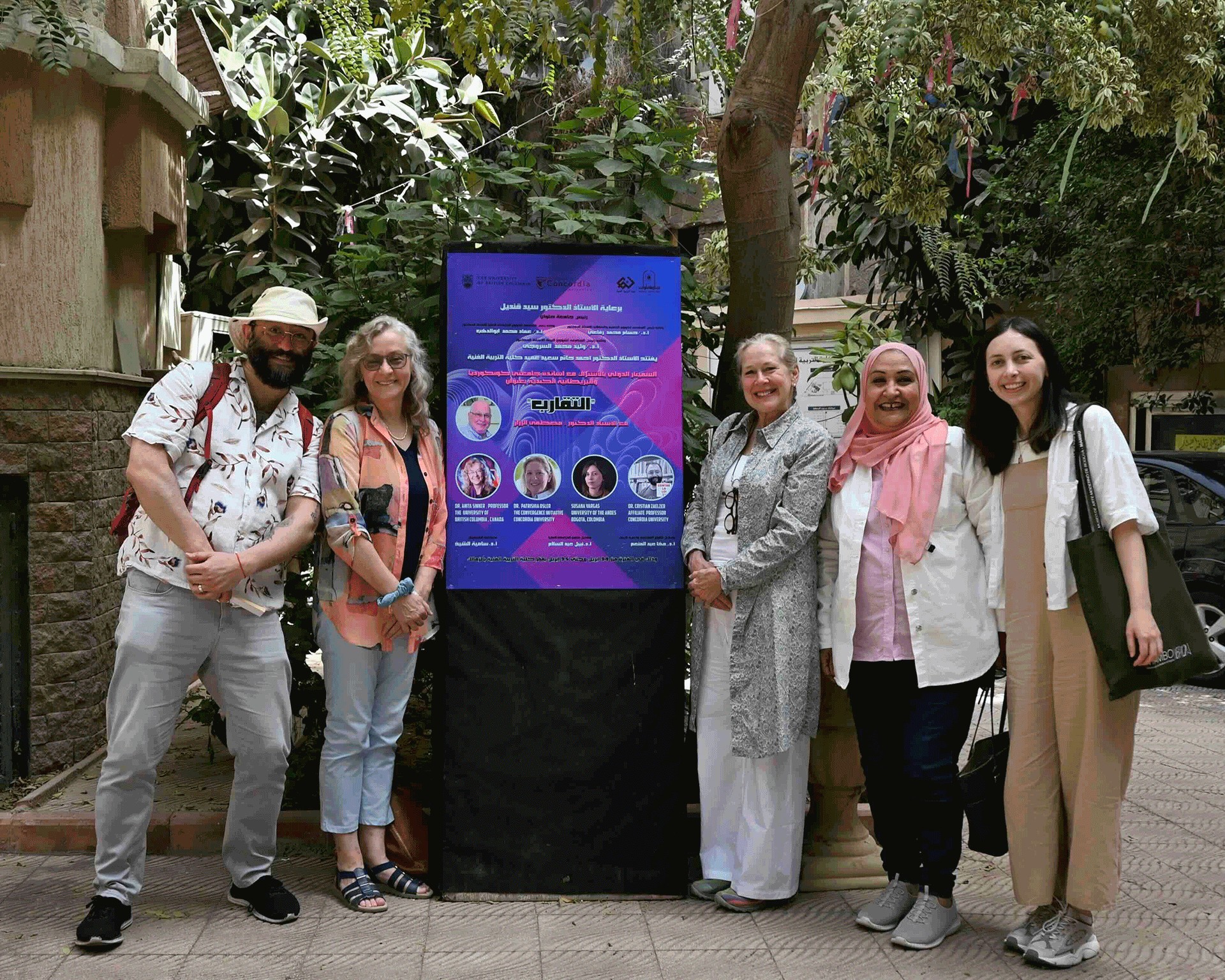

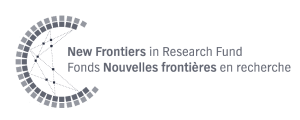
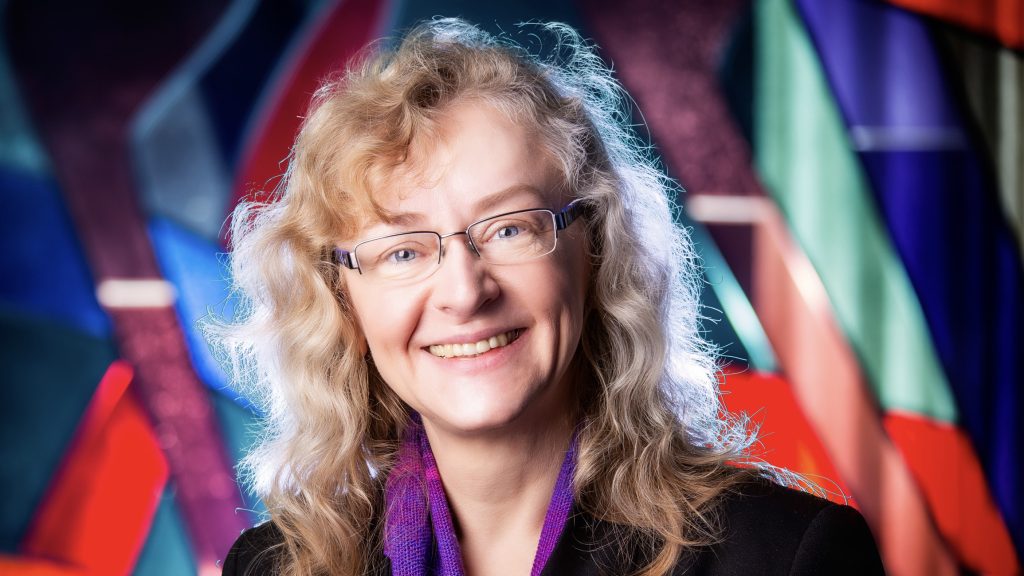
Anita’s research focuses primarily on artwork scholarship, an umbrella term for the arts as research in the field of education that spans arts-based educational inquiry, visual art practice, a/r/tography, artistic practice, performative inquiry, and poetic inquiry, among many approaches. She publishes widely in art and education, from surveys of scholarship to case studies to pedagogic imaginaries of the post-post paradigm, adding to genealogies of thought that underpin art as research, and attending to both theory and practice. Her areas of interest include international art education, geographies of self-in-relation, historical perspectives, autotheory, life writing, collaborative online learning and community education. She continues to work extensively with stories as pedagogic pivots, with particular emphasis on artful inquiry in relation to curriculum studies and social and cultural issues in education.
Anita is the lead editor of the Artwork Scholarship book series (Intellect), with co-editor Dr. Rita Irwin. This series is designed in the spirit of a conversazione, to bring together transdisciplinary dialogues about the arts as research, and to share diverse practices and perspectives in an effort to advance and to foster capacity building for sustainable research futures. In addition, Anita is actively engaged in her art practice and exhibits in academic and community venues. She has secured funding to support her art, teaching and research, with a number of grants from the Social Sciences and Humanities Research Council that have supported collaborative research with teams in Japan, Egypt, Colombia, Spain, Australia, Finland, Canada, and the United Kingdom.
She has served as the editor of the Canadian Review of Art Education, co-editor of the International Journal of Education through Art, and as an Insea World Councillor (2022-23), among related services. Before joining UBC, Anita was a professor of art education at Concordia University in Montreal for thirteen years, where her teaching was recognized with a Fine Arts Distinguished Teaching Award.
The University of British Columbia, 2008, PhD, Curriculum Studies (Art Education)
University of Victoria, 2002, MEd, Curriculum Studies (Adult Education)
The University of British Columbia, 1989, BA, Geography
For more about Anita’s work, please visit her website: https://anitasinner.ca
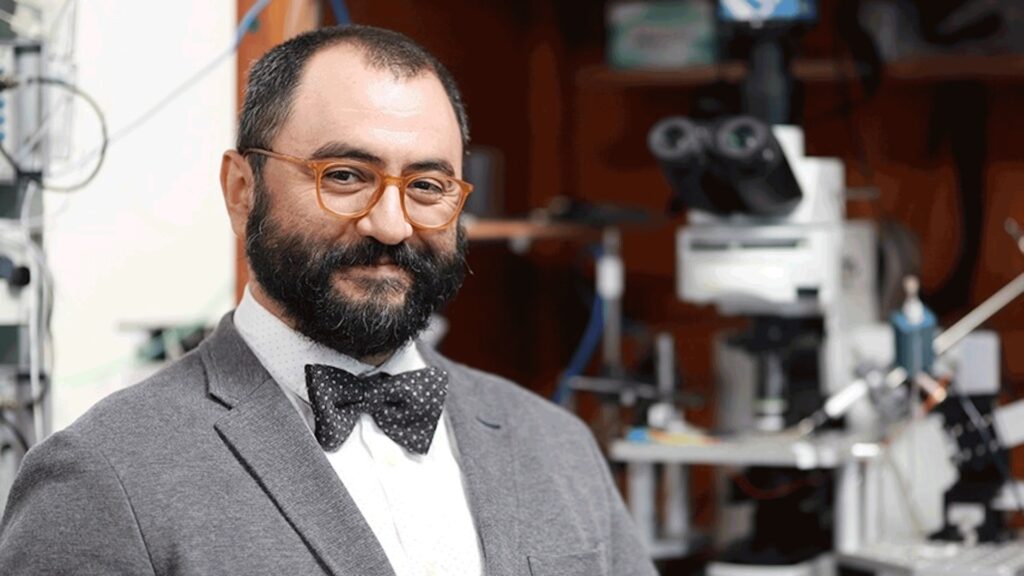
Cristian’s practice explores science and its interpretative approaches to understanding nature. His research delves into scientific epistemology, ethical practice, and the accessibility of knowledge to highlight both historical and current challenges, as well as contemporary successes of this epistemological approach.
Cristian holds a Canadian Council for the Arts Explore and Create grant to study infrared detection and capture for artistic practice. He looks to engage the artist, the scientist, and the public in exploring the unseen, from the basic concepts of electromagnetic spectra to the states of the mind that are invisible to our senses.
As a neuroscientist, Cristian has received the Society for Neuroscience Science Educator Award, the Canadian Association for Neuroscience Advocacy & Outreach Award, the CIHR Brain Star Award, and the shortlist selection for the Falling Walls Science Engage prize in Berlin. His scientific work has been published in journals such as Cell Reports, PNAS, Science, and Nature.
As an educator and art-science curator, Cristian founded the Convergence Initiative, where he served as president for the first seven years. The Convergence Initiative is a Canadian not-for-profit organisation dedicated to advancing (neuro)science education and knowledge through art, promoting the horizontal interaction between science and art disciplines. Their activities include teaching, research, public engagement and outreach. In 2017, Cristian introduced an inter-university course at Concordia University that included collaborations between the Faculty of Fine Arts and the Integrated Neuroscience Program at McGill University in Montreal. He also speared the production of a public seminar series exploring the crossover of science-arts-communication, The Convergence Sci-Art Art-Sci Series, several art-science residence programs in scientific laboratories across Montreal, as well as several collaborations with institutions like the Montreal Museum of Fine Arts, University of Ottawa, SAW Gallery, the Healthy Brain for Healthy Life Program at McGill University, and Canada Heritage. Through Convergence, Cristian has hosted numerous student sciart exhibitions in Montreal, Toronto, Ottawa, and Vienna. He has mentored and advised several professionals in sciart methods during his career, including one Falling Walls Berlin awardee, art education graduate students, and two Canadian Council for the Arts Awardees.
Cristian’s research and commentaries on emotionality in science communication and new methods in science-art collaborations for education are of significant importance. His work not only informs but also enlightens the audience about the intricate relationship between science and art, and how they can be effectively combined for educational purposes.
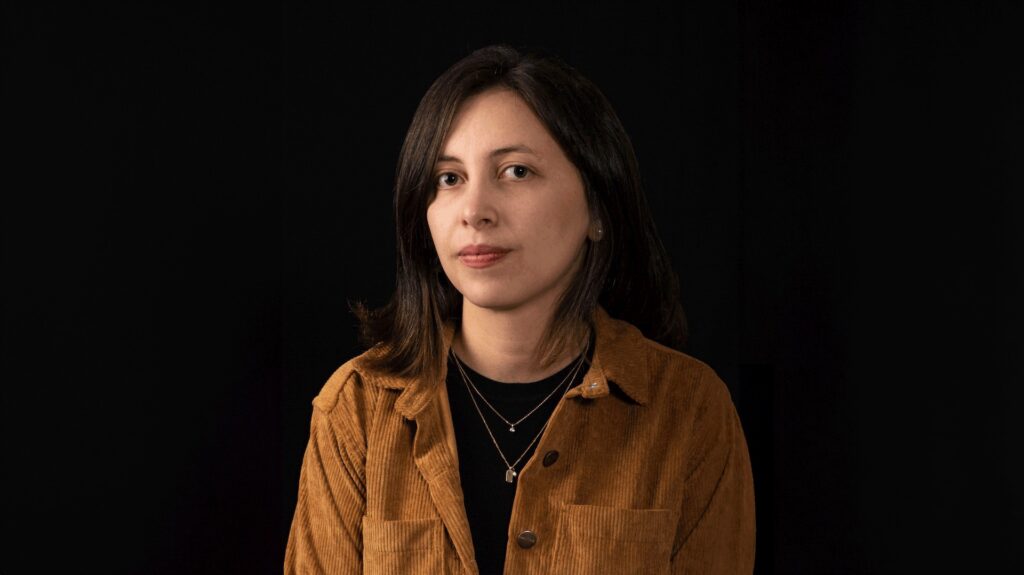
Susana Vargas-Mejía is a Colombian art educator, art historian, and independent researcher passionate about exploring the intersection of art, digital tools, and education. With extensive experience in cultural institutions across Latin America, she has been at the forefront of reimagining how museums engage with their audiences. At the Bogotá Museum of Modern Art (MAMBO), Susana founded the Digital Strategy Department in 2021 and established the museum’s Research Centre in 2024. She also created and coordinated MAMBO’s first residencies program, connecting thinkers and creators from diverse disciplines to foster dialogue and collaborative practices.
Susana also teaches in the Faculty of Experimental Arts and Humanities and in the Department of Art History at Universidad de los Andes in Bogotá, where she explores how digital tools are reshaping museums and public scholarship. Her research focuses on digital strategies for cultural institutions, the role of social media in pedagogy, and computational approaches to museum practices and public collections.
Susana actively shares her insights through international conferences and publications. She has presented at a range of events, including the 8th Conference on Artistic and Arts-based Research in Spain, the WAAE Conference in Greece, “Mapping International Art Education Histories” at Columbia University, the NAEA National Convention in New York City, the Canadian Society for the Study of Education in Montreal and Edmonton, the InSEA World Congress in Turkey and Vancouver, and the Arts and Creativity Conference in Croatia. Her written contributions include the chapter “Disrupting Museum Education: Counter-Monument as a Pedagogical Space” in Propositions for Museum Education.
Susana holds a Master’s in Art Education from Concordia University, where she received multiple awards, including the Faculty of Fine Arts Fellowship. She also earned a Diploma in Contemporary Art Analysis from the University of Barcelona and dual Bachelor’s degrees in Art History and Fine Arts from Universidad de los Andes.
Gravitating between independent projects, academia, and her work within museums, Susana thrives on exploring new ways of seeing and learning. Her practice is rooted in rethinking how we engage with art, education, research, and museum practices—always with an eye toward fostering dialogue, co-creation, and transdisciplinarity, while opening up new, polyphonic, and creative research practices and strategies.
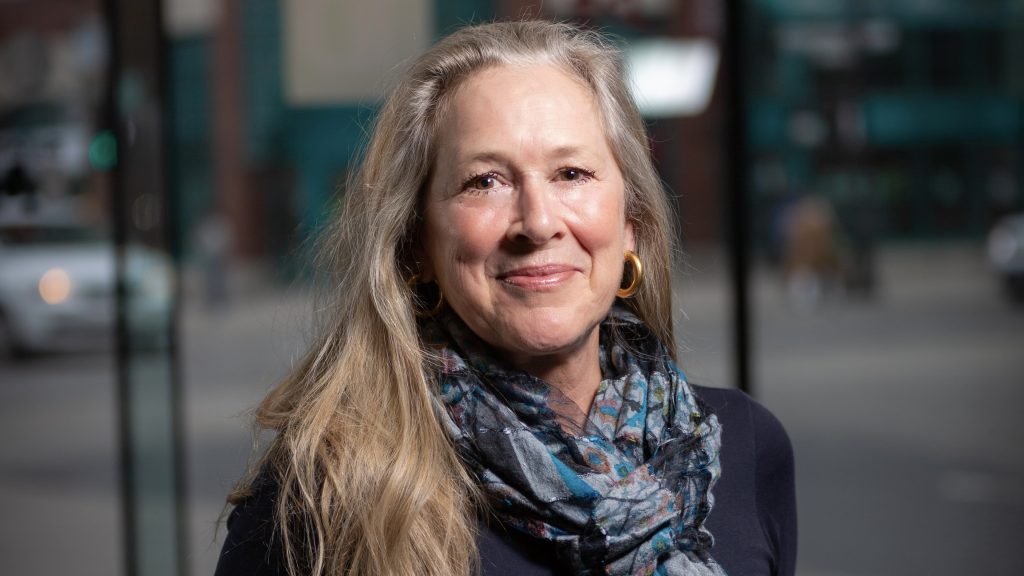
As a practising artist, researcher and art educator, Trish operates a/r/tographically, working across disciplines in fine arts, science and museum culture on projects informed by the neuroscience of creativity. Her scholarly arts-based research explores artistic thinking processes that include metacognition, inspiration and aesthetic perception, seeking new approaches to teaching and learning.
Trish holds a PhD in Art Education from Concordia University’s Faculty of Fine Art, a M.Ed (Art Education) from Western University (London) and undergraduate degrees from OCAD University (Fine Arts, Drawing & Painting) and Queen’s University (English Literature).
While serving as a Concordia Public Scholar, Trish brought current creativity research into public conversations about cognition, the creative process and pedagogy, particularly through the lens of art education. She has collaborated with the Innovation Lab at the Montreal Museum of Fine Art on virtual engagement in museum spaces and recently co-edited two books that explore both international and Canadian museum education practices.
Now President of the Montreal-based Convergence Initiative, a not-for-profit organisation dedicated to advancing (neuro)science education and knowledge through art, Trish focuses on hybridity, promoting exchange and intra-action between the disciplines of science and art. Just as Convergence: Art, Neuroscience + Society brings together fine artists and (neuro)scientists from leading Canadian universities through activities, research, public engagement and outreach, Trish seeks out and fosters art-science collaborations and ecologies of practice that will bring transdisciplinarity, translanguaging and transmedia into a more global and accessible context.
Concurrent with teaching and learning, she manages a design consultancy and studio practice in Toronto, Canada, incorporating multiple modalities through a variety of media. From arts-based research to art-science collaboration, Trish’s portfolio reflects the hybridity and transdisciplinarity that is the future of thinking and learning in higher education.
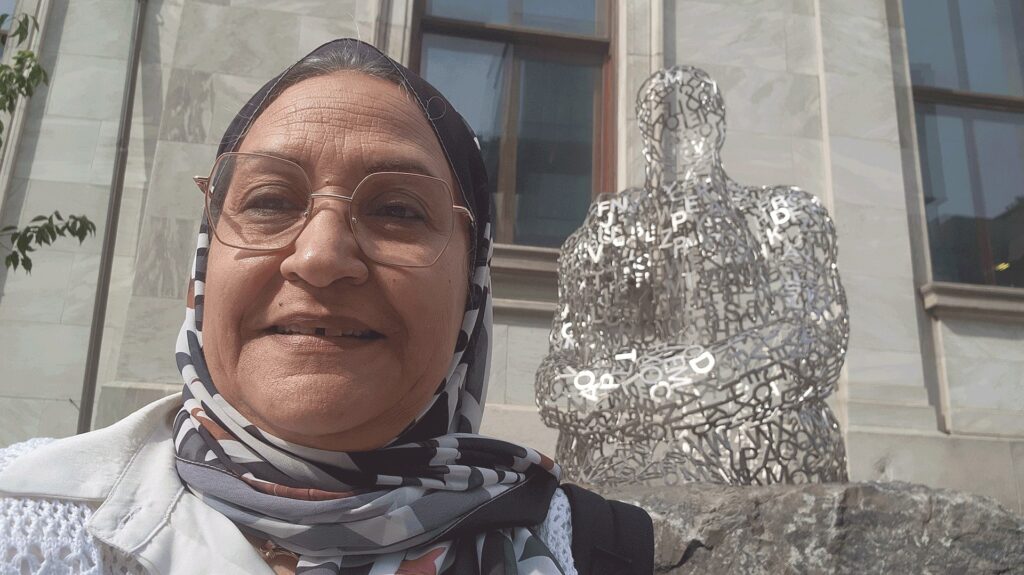
Samia specialises in hand weaving and fibre arts at Helwan University, Egypt, a position she has held since 1982. She has supervised more than 30 Master’s and PhD dissertations since assuming the role of associate professor at the Department of Heritage and Artefacts in 2002. Her participation in international conferences began in 2008. From 2014 to 2017, she served as the Africa & Middle East councillor of InSEA, followed by a term as Vice-President of InSEA from 2017 to 2022.
Her recent achievements include receiving the International Edwin Ziegfeld 2023 award from USSEA, along with the Mahmoud Elbasiony award from InSEA in 2023. Since earning her PhD through a collaborative programme between the Universities of Helwan and New York in 1993, her research interests have centred on in-service arts education and fibre arts issues.
Samia is also a scientific referee for various research journals, including Research in Art Education. She is recognised as an artist, weaver, researcher, and educator deeply committed to the arts and education. She has participated in numerous group and solo exhibitions featuring fibre arts collections, including those in the peer-reviewed magazine of Helwan University. Her most recent solo exhibition, titled “Continuum,” was held in January 2024 at the Modern Art Museum Gallery.
Alongside her academic and artistic pursuits, Samia recently organized a seminar at the Faculty of Art Education as part of the COIL project and Neuroscience research project. In her free time, she works in her studio, producing hand-woven wearables and artworks for her exhibitions.
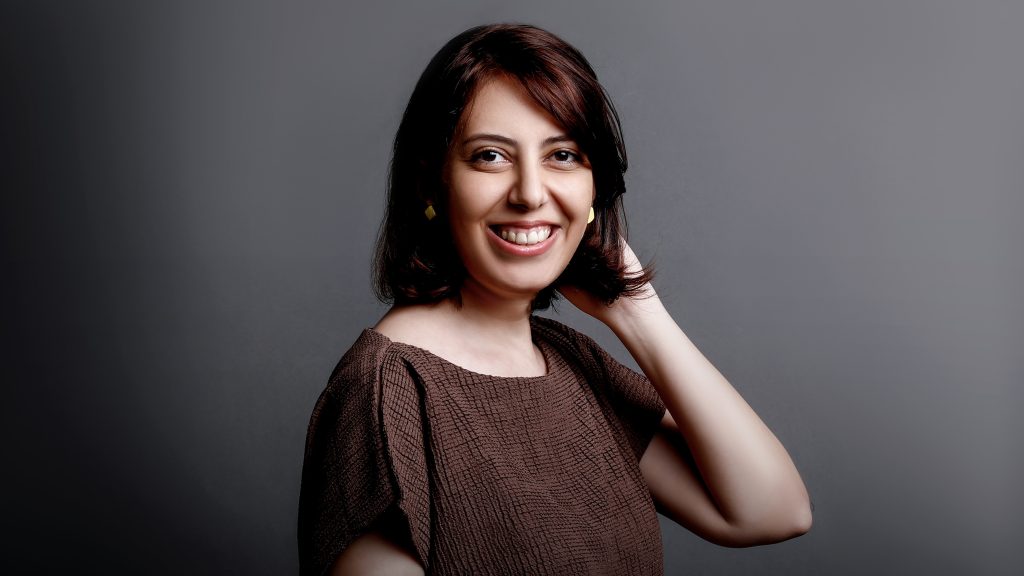
Elly is an accomplished artist, researcher, and educator with a distinguished background in both artistic practice and art education. Her artistic journey began with a BA in Carpet Design from Tabriz Art University in Iran, followed by an MFA in Painting from Sooreh Art University. Elly’s artistic practice explores themes of cultural identity, displacement, the power of public art, and museum practices. As a post-doctoral fellow at The University of British Columbia, Elly delves into groundbreaking research funded by the New Frontiers in Research Fund, investigating the ecologies of sensible practice in artwork scholarship.
Elly’s passion for art education is equally strong. After immigrating to Canada, she pursued a PhD in Art Education at Concordia University. With exceptional academic achievements and GPA, she fast-tracked into the PhD programme from her Master’s, showcasing her academic acumen and dedication to her career. Her doctoral research explores diverse art practices in museum spaces and the transformative potential of walking methodologies in art education. Her academic journey intertwines with her role as a teacher, where she imparts knowledge and inspires creativity. From teaching courses on community art education to conducting workshops and seminars globally, Elly fosters a dynamic learning environment where art becomes a conduit for cultural exchange and critical inquiry.
Elly has made significant contributions to her field, boasting numerous publications in peer-reviewed journals and prestigious book chapters, shedding light on various facets of art education and practice. Her research experiences span international collaborations and grant-funded projects, including her current investigation into the ecologies of sensible practice in artwork scholarship.
Beyond academia, Elly’s artistic vision shines through her curatorial endeavours and exhibitions. From co-founding an art school to curating collaborative exhibitions that bridge international divides, she embodies the spirit of cultural exchange and creative exploration. She has exhibited her work in various solo and group exhibitions both in Iran and Canada.
Post-doctoral Fellow, The University of British Columbia, 2023 – present
PhD in Art Education, Concordia University, 2023
MA in Painting, Sooreh Art University, Tehran, Iran, 2012 – 2015
BA in Carpet Design, Tabriz Art University, Tabriz, Iran, 2007 – 2011